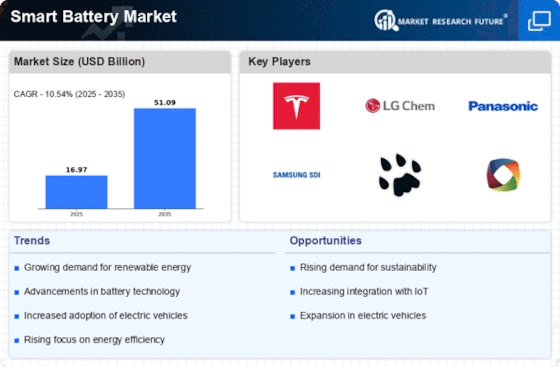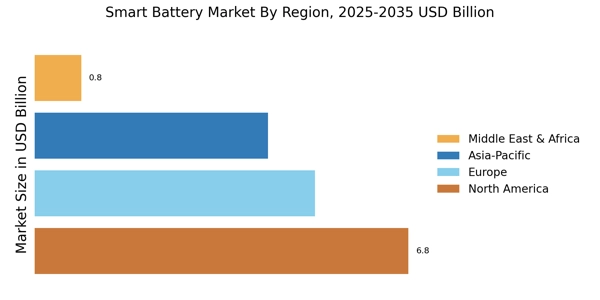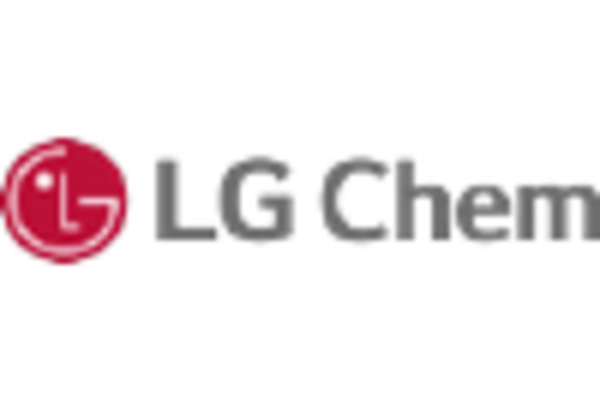Increased Focus on Energy Efficiency
Energy efficiency has become a focal point for both consumers and industries, propelling the Smart Battery Market Industry forward. As energy costs rise and environmental concerns mount, there is a growing emphasis on reducing energy consumption. Smart batteries, with their ability to optimize energy usage, are increasingly being integrated into various applications, including home energy storage systems and industrial automation. The market for energy-efficient solutions is expected to expand, with smart batteries playing a crucial role in this transition. In 2025, the energy efficiency segment is anticipated to contribute significantly to the overall growth of the smart battery market, as stakeholders seek sustainable alternatives that align with regulatory standards and consumer expectations.
Rising Demand for Portable Electronics
The increasing demand for portable electronic devices such as smartphones, laptops, and tablets is a key driver for the Smart Battery Market Industry. As consumers seek longer battery life and faster charging capabilities, manufacturers are compelled to innovate. In 2025, the portable electronics segment is projected to account for a substantial share of the smart battery market, driven by advancements in battery technology. The need for lightweight and efficient batteries is paramount, as users expect their devices to perform optimally without frequent recharging. This trend indicates a shift towards smart batteries that can adapt to varying power requirements, thereby enhancing user experience. Consequently, the Smart Battery Market Industry is likely to witness significant growth as manufacturers respond to these evolving consumer preferences.
Growing Adoption of Smart Home Technologies
The growing adoption of smart home technologies is a significant driver for the Smart Battery Market Industry. As households increasingly integrate smart devices for automation and energy management, the demand for reliable and efficient power sources rises. Smart batteries are essential for powering these devices, ensuring seamless operation and connectivity. In 2025, the smart home segment is expected to contribute notably to the smart battery market, as consumers prioritize convenience and energy efficiency. The integration of smart batteries into home energy systems not only enhances performance but also supports the overall sustainability goals of modern households. This trend indicates a robust future for the Smart Battery Market Industry as it aligns with the broader movement towards smart living.
Expansion of Electric Vehicle Infrastructure
The expansion of electric vehicle (EV) infrastructure is a pivotal driver for the Smart Battery Market Industry. As governments and private entities invest in charging stations and related technologies, the demand for advanced battery systems is likely to surge. In 2025, the electric vehicle segment is projected to represent a considerable portion of the smart battery market, as consumers increasingly adopt EVs for their environmental benefits. This trend is further supported by incentives and subsidies aimed at promoting electric mobility. The integration of smart batteries in EVs not only enhances performance but also contributes to the overall efficiency of the charging process. Thus, the Smart Battery Market Industry stands to benefit from the ongoing developments in EV infrastructure.
Technological Advancements in Battery Chemistry
Technological advancements in battery chemistry are significantly influencing the Smart Battery Market Industry. Innovations such as lithium-sulfur and solid-state batteries are emerging, offering higher energy densities and improved safety profiles. These advancements are expected to enhance the performance of smart batteries, making them more appealing for various applications, including renewable energy storage and electric vehicles. In 2025, the market for advanced battery chemistries is likely to expand, driven by the need for longer-lasting and more efficient energy storage solutions. As manufacturers invest in research and development, the Smart Battery Market Industry is poised for transformation, with new technologies potentially reshaping consumer expectations and industry standards.

















